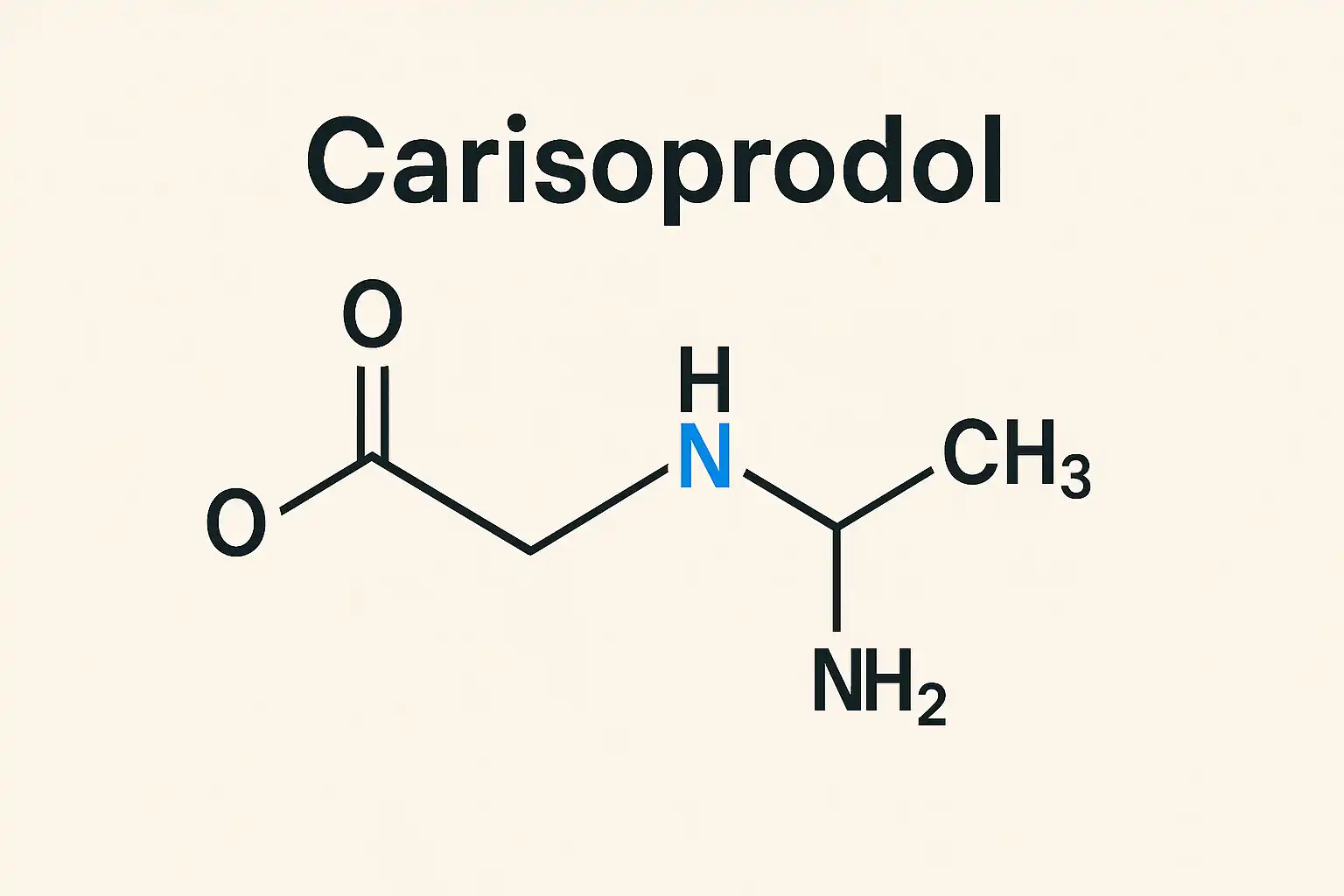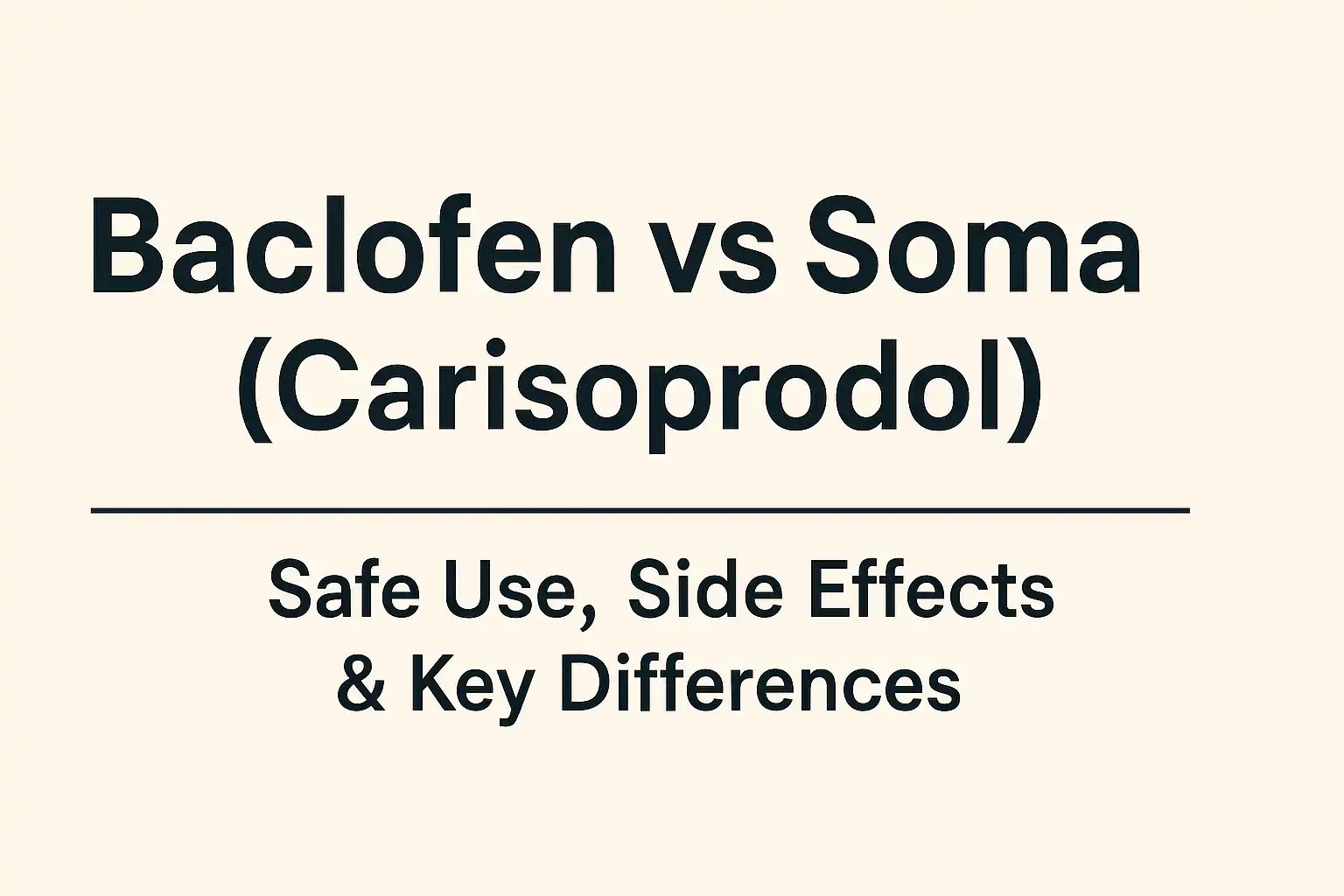Baclofen vs Soma (Carisoprodol): Safe Use, Side Effects & Key Differences
Key Differences at a Glance
| Factor | Baclofen | Soma (Carisoprodol) |
| Primary Use | Chronic spasticity (MS, spinal injuries) | Acute muscle pain (2-3 week use) |
| Controlled Substance | No | Schedule IV (moderate abuse risk) |
| Typical Treatment Duration | Months to years | 7-14 days maximum |
| Mechanism of Action | GABA-B receptor agonist | CNS depressant (prodrug for meprobamate) |
Clinical Comparison: Baclofen vs Soma
Baclofen (Lioresal)

- FDA Approval: 1977
- Half-Life: 2.5-6.8 hours
- Forms: Oral tablets, intrathecal pump
- Typical Dose: 40-80mg/day (oral)
- Cost: $15-$30/month (generic)
Carisoprodol (Soma)

- FDA Approval: 1959
- Half-Life: 8 hours (active metabolite: 10-18 hrs)
- Forms: Oral tablets only
- Typical Dose: 250-350mg 3x daily
- Cost: $250+/month (brand)
How They Work: Pharmacological Differences
Baclofen
Acts as a GABA-B receptor agonist in the spinal cord, inhibiting excitatory neurotransmitter release to reduce muscle spasticity. Does not directly affect skeletal muscles.
“Baclofen’s effects are more selective for spinal reflexes compared to Soma’s broad CNS depression.” – Dr. Miller
Soma (Carisoprodol)
Metabolized to meprobamate (an anxiolytic with barbiturate-like effects). Modulates GABA-A receptors throughout the CNS, producing generalized sedation and muscle relaxation.
“About 30% of patients metabolize Soma into meprobamate rapidly, increasing abuse potential.” – 2024 Journal of Addiction Medicine
Side Effect Comparison
| Side Effect | Baclofen Incidence | Soma Incidence | Clinical Notes |
|---|---|---|---|
| Drowsiness | 8.8% | 28.5% | Soma causes more significant daytime sedation |
| Dizziness | 6.1% | 19.2% | Both require fall risk assessment in elderly |
| Dependence Risk | Low (0.3%) | High (9.1%) | Soma classified as Schedule IV controlled substance |
Patient Case: Choosing Between Baclofen vs Soma
Scenario: 45-year-old male with:
- Chronic lower back spasms (3+ years duration)
- History of alcohol use disorder (sober 5 years)
Decision: Baclofen was selected due to:
- Lower abuse potential (critical given addiction history)
- Better long-term safety profile
- Option for intrathecal delivery if oral therapy fails
Safety Considerations
Withdrawal Risks
Baclofen: Can cause seizures, hyperthermia if stopped suddenly after prolonged use (>2 months)
Soma: May trigger anxiety, insomnia, or tremors during withdrawal
Dangerous Combinations
Avoid with:
- Alcohol (potentiates CNS depression)
- Opioids (respiratory depression risk)
- Benzodiazepines (synergistic sedation)
FDA Black Box Warning for Soma
Carisoprodol metabolites have been associated with:
- Increased motor vehicle accident risk (2.4x higher)
- Respiratory depression when combined with alcohol
- Seizures in overdose (>3000mg)
Frequently Asked Questions
Can baclofen be used for back pain like Soma?
Answer: While sometimes prescribed off-label for back spasms, baclofen is not FDA-approved for acute musculoskeletal pain. Clinical studies show it’s 28% less effective than Soma for acute back pain (Journal of Pain Research, 2024). However, it may be preferred for:
- Patients with addiction history
- Chronic spasticity components
- Those requiring long-term therapy
Which is safer for elderly patients?
Answer: Baclofen generally has a better safety profile in geriatric patients because:
| Factor | Baclofen | Soma |
| Fall Risk | Moderate | High |
| Cognitive Effects | Mild confusion | Significant sedation |
| Dosing Adjustments | Renal impairment | None established |
Clinical Tip: Start baclofen at 5mg 2x daily in elderly, increasing slowly.
Need Help Choosing a Muscle Relaxant?
Schedule a consultation with Dr. Miller for personalized medication advice
Book a Telehealth VisitMedical Disclaimer
This content is for informational purposes only and does not constitute medical advice. Always consult your healthcare provider before making medication changes. Individual experiences may vary.


